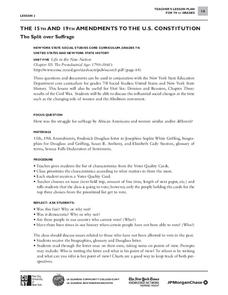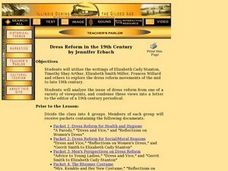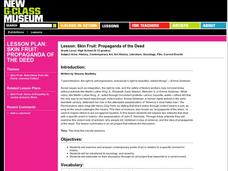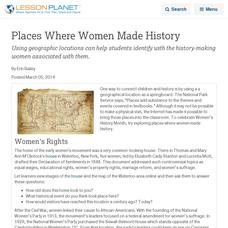Curated OER
Women's Rights Historic Sites
Students use maps, readings, floor plans, photos and cartoons to research the conditions of upstate New York in the first half of the 19th century, examine the issues that led to Women's Rights Convention of 1848 and consider current...
City University of New York
The Split Over Suffrage
Compare and contrast Frederick Douglass's and the National Women's Suffrage Association's stances on equal rights and suffrage with a series of documents and worksheets. Learners work together or independently to complete the packet, and...
City University of New York
The 15th and 19th Amendments to the U.S. Constitution
Who gets to vote? Learn more about struggles for suffrage throughout United States history with a lesson based on primary source documents. Middle schoolers debate the importance of women's suffrage and African American suffrage before...
University of California
Equal Rights? The Women's Movement from Suffrage to Schlafly
If you've never heard of the Equal Rights Amendment, it's probably because there isn't one in the United States Constitution. Delve into the contentious history behind the ERA, its founders and supporters, and reasons for its political...
C3 Teachers
Women’s Rights: What Does It Mean to Be Equal?
A guided-inquiry lesson asks seventh graders to research the compelling question, "What does it mean to be equal?" Guided by three supporting questions, researchers complete three formative performance tasks and gather evidence from...
Curated OER
Women's History Week
Students investigate the contributions of women who influenced human rights in US history. They examine the influence Susan B. Anthony, Harriet Tubman, Sojourner Truth and Elizabeth Cady Stanton by participating in a jigsaw activity....
Macmillan Education
Women's History Month Activity Kit
Boost reading comprehension and shed light on famous women of history with books and learning activities, which include a board game, word search, crossword puzzle, and a quiz.
EngageNY
Grade 11 ELA Module 2: Unit 2, Lesson 12
Why is it important to make connections across texts? Scholars discover the answer with instructional activity 12 of 14 from the Grade 11 ELA Module 2: Unit 2 series. Pupils analyze the development of ideas in three nonfiction texts,...
EngageNY
Grade 11 ELA Module 2: Unit 2, Lesson 13
Two minds are better than one. Learners engage in an evidence-based discussion to identify central ideas in Audre Lorde's poem "From the House of Yamanjá" and one additional nonfiction text. They complete a Cross-Evidence Collection Tool...
National Woman's History Museum
Seneca Falls and Suffrage: Teaching Women's History with Comics
As part of the study of women's history, young scholars examine Chester Comix's strips about the Seneca Falls Convention and four 19th century leaders in the struggle for equal rights. After researching other elements of the Suffrage...
National Woman's History Museum
From the Declaration of Independence to the Declaration of Sentiments
As part of a study of women's rights in early America, class members compare the Declaration of Independence to the Declaration of Sentiments presented at the Seneca Falls Convention. As an exit ticket, individuals explain whether or not...
National Woman's History Museum
Women's Suffrage Movement
The National Women's History Museum offers a 20-slide presentation that details the history of the Women's Suffrage Movement from its creation in the 1830s through the passage of the Nineteenth Amendment in 1920.
Smithsonian Institution
The Suffragist: Educator's Guide for Classroom Video
Class members take on the role of historical investigators to determine why it took 40 years for women in the United States to get the right to vote. Sleuths view videos and analyze primary sources and images to gather evidence to answer...
K20 LEARN
Analyzing Early American Figures: Analyzing History
Who were they? High school freshmen brush up on their research skills by investigating an important person in American history. They select a name, fill out a KWHL chart, and research why their person is important. Scholars then complete...
Polk County Public Schools
Suffragists
The Women's Rights movement is the focus of an engaging and collaborative exercise, in which young historians use information found in textbooks, class notes, and the provided documents to craft a DBQ essay.
Curated OER
Dress Reform in the 19th Century
Eleventh graders utilize the writings of Elizabeth Cady Stanton, Timothy Shay Arthur, Elizabeth Smith Miller, Frances Hard and others to explore the dress reform movements of the mid to late 19th century.
Curated OER
Dress Reform in the 19th Century
Students read and discuss the writings of Elizabeth Cady Stanton, Timothy Shay Arthur and others to explore mid to late 19th century dress reform. They use their findings to write a letter to an editor from a 19th century viewpoint.
What So Proudly We Hail
The Meaning of America: Enterprise and Commerce
Using Mark Twain's The Man That Corrupted Hadleyburg, invite your learners to consider the concept of virtue in a democratic society devoted to gain and self-interest. This stellar resource guides your class members through a close...
What So Proudly We Hail
The Meaning of America: Freedom and Individuality
What are the strengths and weaknesses of American individualism and independence? Explore these principles through a close reading of Jack London's To Build a Fire, and engage in high-level discussion with your class by analyzing the...
National Endowment for the Humanities
Cultural Change
High schoolers research the passage of the 19th Amendment as an illustration of the mutual influence between political ideas and cultural attitudes. They also read the Seneca Falls Declaration and explore the cultural shifts it both...
Curated OER
Lesson: Skin Fruit: Propaganda of the Deed
Art can express acts of injustice and move society to action. Upper graders analyze contemporary art relating to specific moments in history. They discuss propaganda, anarchy, sociology, and violence as activism. After researching and...
Curated OER
A Brief History of Women in America
The story of women throughout American history is fascinating. Travel the path from domestic slave to the modern day with advocates such as Susan B. Anthony, the Grimké Sisters, and Gloria Steinem. A wonderful presentation that shows how...
Curated OER
Places Where Women Made History
Using places can help students identify with the history-making women associated with them.
National Endowment for the Humanities
Women's Equality: Changing Attitudes And Beliefs
Students analyze archival materials contemporaneous with the birth of the Women's Rights Movement, and begin to appreciate the deeply entrenched opposition the early crusaders had to overcome. They discuss whether or not such attitudes...

























